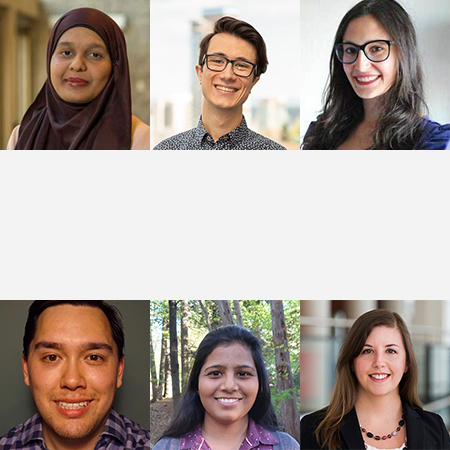#VoteScience: lessons learned and building science advocacy beyond the election cycle
Author(s):
Farah Qaiser
Frank Telfer
Tina Gruosso
Bensun Fong
Sivani Baskaran
Katie Gibbs

Science didn’t make headlines during the 2019 Canadian federal elections — but for once, it did receive more attention, in part, due to scientists and science supporters collectively speaking up across the country.
Recent efforts, such as the #SupportTheReport campaign, have made it clear that when science advocates come out in numbers and speak with one voice, it can have a noticeable impact. That’s why, on August 8, 2019, a coalition of Canadian science organizations and student groups came together to launch the #VoteScience campaign: a national, non-partisan effort to advocate for science in the federal elections, and make science an election issue.
Specifically, we — aka Evidence for Democracy, Science & Policy Exchange (SPE), and the Toronto Science Policy Network (TSPN) — built a collection of tools and resources to empower Canadian scientists and science supporters to engage with their local candidates on science issues and the importance of evidence-informed decision-making. Our goal was to make it easy for as many Canadians as possible to engage with their candidates — and they did.
Over the past three months, our #VoteScience portal received over 3,600 visitors, including 600 visitors who used our email form to reach out directly to their local candidates. Collectively, we took #VoteScience selfies, distributed postcards to supporters across Canada, and even wrote postcards to every sitting Member of Parliament (in addition to candidates from all parties in each of our own ridings). Also of note, we distributed a , to help better inform Canadians about where the federal parties stand on relevant science issues, and received responses from all but one party. We’ve also advocated for science through various media outlets, including commenting for articles appearing in The Narwhal and Nature News, and penning op-eds for outlets such as the National Observer, University Affairs, Le Devoir, and Découvrir.
In addition to our virtual engagement, #VoteScience campaign supporters also led in-person efforts across the country. For example, in Toronto, TSPN partnered with RCIScience and the Canadian Society for Molecular Biosciences to host a #VoteScience launch event, featuring leading science advocates such as Dr. David Naylor, Dr. Imogen Coe and Dr. Amanda Veri. Over in Ottawa, ACFAS, in partnership with various groups including SPE, hosted a Bar des sciences: campagne fédérale 2019 event, featuring candidates from five different federal parties. Impressively, SCWIST partnered with various groups – including SPE, 500 Women Scientists Montreal, and the IWS Network – to engage with candidates on the intersection of women, science, and policy in several cities across the country. The Raw Talk Podcast took a different approach and produced an hour-long episode dedicated to issues in Canadian science policy and how to speak up for science in the context of the federal elections. Support didn’t come from only Canadian scientists though! For example, a BC reverend shared the #VoteScience campaign with his congregation, imploring them to engage with their candidates.
Many candidates also took note of the #VoteScience campaign. For example, newly re-elected Halifax MP Andy Fillmore visited Dr. Paola Marignani’s lab to learn more about their ongoing research focused on tumour suppressors and precision medicine. Similarly, NDP candidates Diana Yoon (Spadina-Fort York) and Brian Chang (Toronto Centre) took part in our #VoteScience Twitter chat and shared how they were prioritizing science in their platforms.
The #VoteScience campaign wasn’t the only voice advocating for science in the 2019 federal election. Other notable efforts included a questionnaire sent to federal parties regarding their environmental platforms, and of course, the national climate strikes which took place across 80 Canadian cities on September 27, 2019. In addition, science made a few, albeit rare, appearances in election conversations, such as during the 100 Debates (including one hosted by E4D in Ottawa-Vanier) or when CBC Quirks & Quarks invited four MP candidates to take part in a science and environmental policy debate, where questions included whether the parties would commit to implementing the remaining Fundamental Science Review recommendations and continuing the Chief Science Advisor role.
The efforts and successes of the Canadian science community and science advocates are not to be understated — but it’s worth noting that despite these collective efforts, most of the federal party leaders rarely raised science as an election issue in the debates, platform documents or in the wider mainstream media.
Today, we have a Liberal minority government. If the past is any indication, the confidence in minority governments can lack stability. An election could be called at any point, and so science advocacy cannot stop with the end of the #VoteScience campaign.
We’re asking for your help here again and in moving forward.
For science to have a place at the decision-making table as a non-partisan and timeless issue, we cannot stop advocating for science and engaging with our elected representatives. The campaign for science must be a permanent one – daunting perhaps, but incredibly critical for the future of our nation.
More on the Author(s)
Farah Qaiser
University of Toronto
Graduate Student
Toronto Science Policy Network
President
Frank Telfer
University of Toronto
Graduate student
Toronto Science Policy Network
External Communications Executive
Tina Gruosso
Science & Policy Exchange
President
Global Young Academy
Member
Bensun Fong
University of Ottawa
PhD Candidate
Sivani Baskaran
University of Toronto
Graduate Student
Toronto Science Policy Network
Vice-president
Katie Gibbs
Evidence for Democracy

